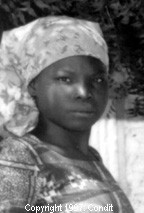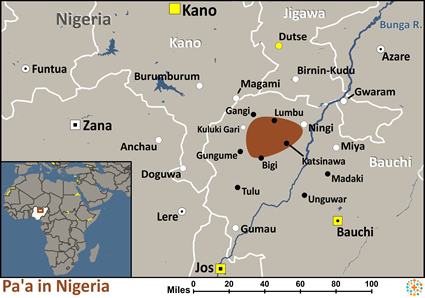The Pa'a, also known as the Afawa, inhabit the banks of the Bunga River, which lies in Nigeria's northern Bauchi Province. The Pa'a claim to have migrated westward from Borno to a town called Wushi several centuries ago. Many of them were driven into the Ningi Hills where they made their headquarters in the fertile lands of Ari. Today, the Pa'a are found throughout various districts, including Ningi and Ganjuwa.
The Pa'a live among the Warji people, sharing similar language, culture, and religious beliefs. In fact, many consider the two groups as one. They are also surrounded by two devout Muslim groups, the Hausa and the Kanuri. For this reason, Islam is slowly seeping into the cracks of the Pa'a traditional culture. In addition, their own Chadic language is slowly being replaced by the Hausa language. The Pa'a located in the rural regions have poor roads, no health care facilities, and do not encourage their children to attend school.
Most of the Pa'a are farmers. Their primary crops are guinea corn and millet. Groundnuts, beans, onions, okra, and peppers are other crops. Although some hunt and fish on a small scale, trade has become increasingly more important due to the influence of the Hausa. Others have become blacksmiths or craftsmen specializing in dyeing cloth and making string curtains from bark.
The Pa'a live in compact, walled towns that are usually located at the base of hills. The towns are divided into wards or clan lineages, and the eldest male of each one is its head. Each ward has two "clubhouses," one for the elders and one for the youth. These are places where the groups gather and socialize.
Traditionally Pa'a marriages were arranged by the parents. Because more than one set of parents may want their sons to have a particular girl as a wife, there is much competition between suitors. Once the young man is chosen as the groom, he has the duty of helping the girl's family with farm work. He is also required to pay a bride price consisting of guinea corn and fish. There is no official wedding ceremony. Instead, after he completes a year of farm work, the man may take his wife home.
The initiation rite into manhood is very important for the Pa'a. Boys between the ages of nine and eleven must have their heads shaved. Afterwards, they are taken to a shrine in the forest to be circumcised by the priest. They are then offered fowl and beer and are taken to spend the night in the priest's house. The dodo, a masked image that represents a family ancestor, comes to scare them during the night to test their bravery. Afterward they dance to celebrate the boys' entry into manhood.
Although a minority of the Pa'a have embraced Islam, most still follow their traditional ethnic beliefs. Worship of clan ancestors and idols is the basis for these beliefs. They make offerings to their ancestors at special shrines. During times of trouble, sickness, or disaster, the chief/priest climbs the hills near Tiffi to offer animal sacrifices.
Each year, the Pa'a celebrate the harvest thanksgiving festival and make animal sacrifices to the family spirits. Eating, drinking, and masquerade dances follow the sacrifices.
The Pa'a are also known for their rain-making magic. Elders pour the blood of chickens into the sacred grove of the forest, while women beat drums outside the village.
Very few Christian resources are available in the Pa'a language. Additional Christian laborers and evangelistic tools are desperately needed.
Pray for the Lord to meet the physical and spiritual needs of the Pa'a people and they will respond with gratitude and faith.
Pray for the Lord to send dreams and visions to Pa'a leaders so they will open the door for Jesus to enter the hearts of their people.
Pray for the Lord to send out Holy Spirit anointed workers to the Pa'a in Sudan.
Pray for a Disciple Making Movement among the Pa'a this decade.
Scripture Prayers for the Pa'a, Afawa in Nigeria.
| Profile Source: Joshua Project |

























